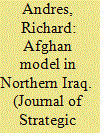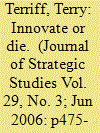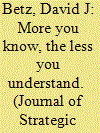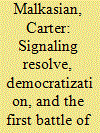| Srl | Item |
| 1 |
ID:
074802


|
|
|
|
|
| Publication |
2006.
|
| Summary/Abstract |
In Operation 'Iraqi Freedom', as the Coalition's heavy forces fought in the South, in the North a handful of special operations forces, working with Kurdish rebels, clashed with the Iraqi army along the Green Line. In operations reminiscent of those used a year earlier to defeat the Taliban in Afghanistan, the lightly armed and heavily outnumbered Coalition forces called in air strikes to defeat Iraq's regular and Republican Guard army divisions. This article tells the story of these operations and discusses some of their implications for future US military policy. The success of the Afghan model in Iraq goes a long way toward demonstrating the efficacy of new air-heavy tactics and shows the strategic value of using light indigenous allies to replace heavy US land forces in both conventional combat and occupation operations.
|
|
|
|
|
|
|
|
|
|
|
|
|
|
|
|
| 2 |
ID:
074805


|
|
|
|
|
| Publication |
2006.
|
| Summary/Abstract |
The purpose of this article is twofold. First, this article contributes to the understanding of the origins of maneuver warfare as the capstone doctrine of the Marine Corps. It does so by identifying a second source that fostered change in the Marine Corps - one in addition to disquiet about the conduct of the war in Vietnam - which stemmed from the challenges posed by the United States' post-Vietnam strategic and military reorientation. And second, this article examines the influence of organizational culture, or identity, on innovation in the Marine Corps. A critical strand in the growing literature on military innovation focuses on organizational culture and how it influences the behavior and responses of particular military organizations. This article contributes to this literature by analyzing the influence of the organizational culture of the Marine Corps in shaping what was deemed an appropriate response to the challenges it confronted in the 1970s.
|
|
|
|
|
|
|
|
|
|
|
|
|
|
|
|
| 3 |
ID:
074804


|
|
|
|
|
| Publication |
2006.
|
| Summary/Abstract |
This article argues that the prewar planning process for postwar Iraq was plagued by myriad problems, including a dysfunctional interagency process, overly optimistic assumptions, and a lack of contingency planning for alternative outcomes. These problems were compounded by a lack of civilian capacity during the occupation period, which led to a complicated and often uncoordinated relationship with the military authorities who found themselves taking the lead in many reconstruction activities. Taken together, these mistakes meant that US success on the battlefield was merely a prelude to a postwar insurgency whose outcome remains very much in doubt more than three years later.
|
|
|
|
|
|
|
|
|
|
|
|
|
|
|
|
| 4 |
ID:
074806


|
|
|
|
|
| Publication |
2006.
|
| Summary/Abstract |
Since the 1991 Gulf War military analysts have talked of a Revolution in Military Affairs (RMA), the idea that just as the 'Information Era' has transformed how societies live and work it has also transformed the way that they fight. Advocates of the two derivative concepts of the RMA, Information Warfare (IW) and Network-Centric Warfare (NCW), are distinguished from each other in that the former sees information as a potential weapon in and of itself whereas the latter seeks to exploit data to make regular weapons more effective. But both make exaggerated and misleading claims because the experience of recent campaigns in Afghanistan and Iraq suggests that both IW and NCW are extremely tricky to implement in practice. Moreover, 'information' is a double-edged sword which benefits, strengthens, and enhances the operational effectiveness of non-conventional forces as much as or more than it does conventional forces.
|
|
|
|
|
|
|
|
|
|
|
|
|
|
|
|
| 5 |
ID:
074803


|
|
|
|
|
| Publication |
2006.
|
| Summary/Abstract |
Perceptions and efforts to signal resolve can play an important role in counterinsurgency. The Coalition offensive against Fallujah in April 2004 demonstrates the limitations of relying on military force to signal resolve. The offensive catalyzed insurgent violence in Iraq and generated popular support for the insurgency. The Coalition prematurely halted the offensive because the Iraqi Governing Council (IGC) could not maintain support for the Coalition in the face of popular outrage. Given the importance of democratizing Iraq and establishing a sovereign government, the objections of the IGC could not be ignored. Without Iraqi political support, military force ultimately signaled weakness instead of resolve.
|
|
|
|
|
|
|
|
|
|
|
|
|
|
|
|
| 6 |
ID:
074807


|
|
|